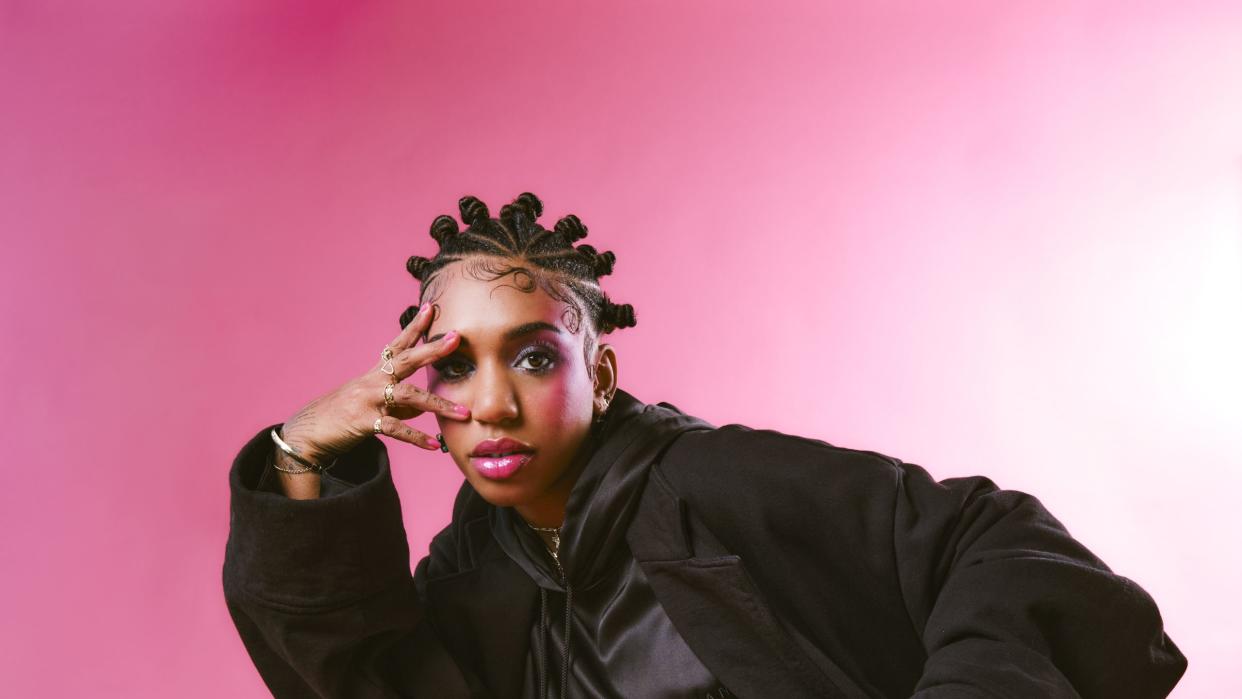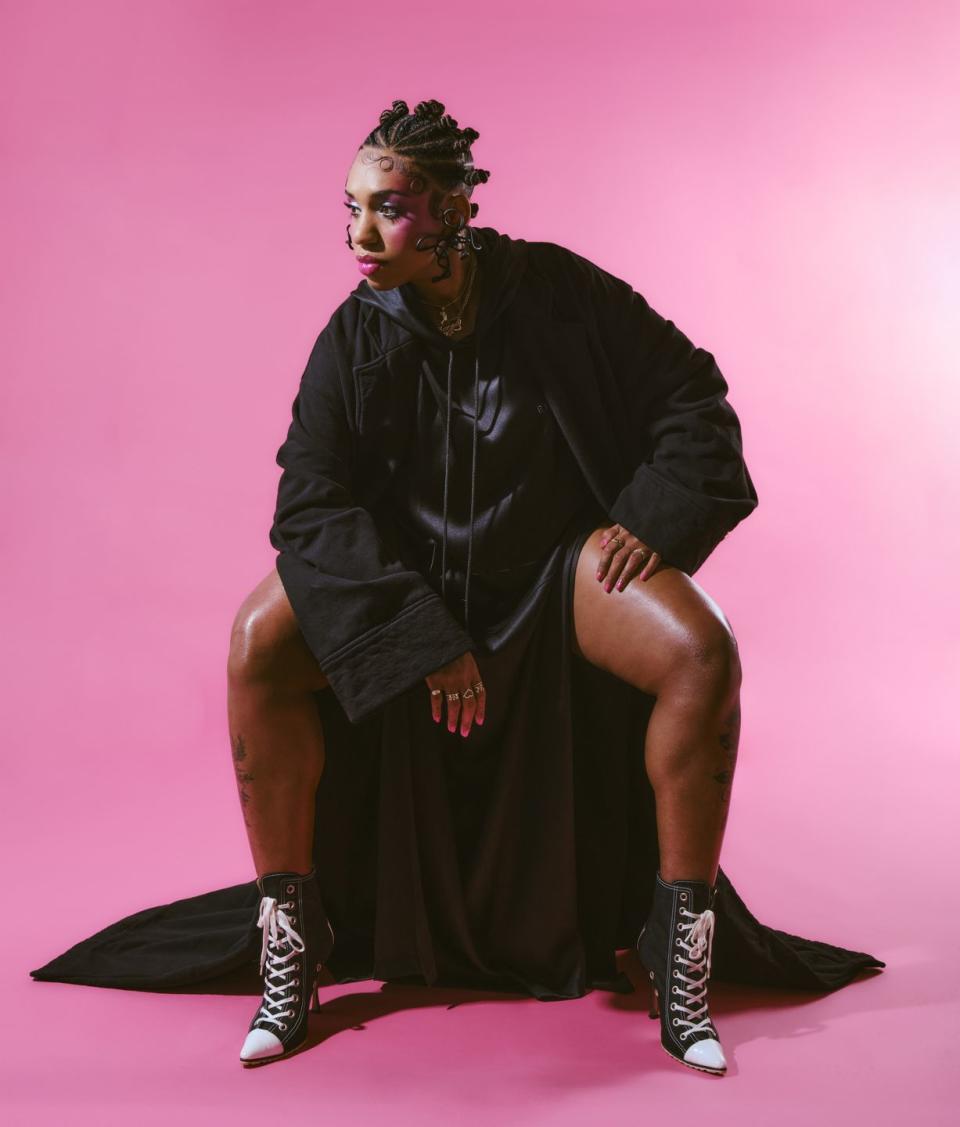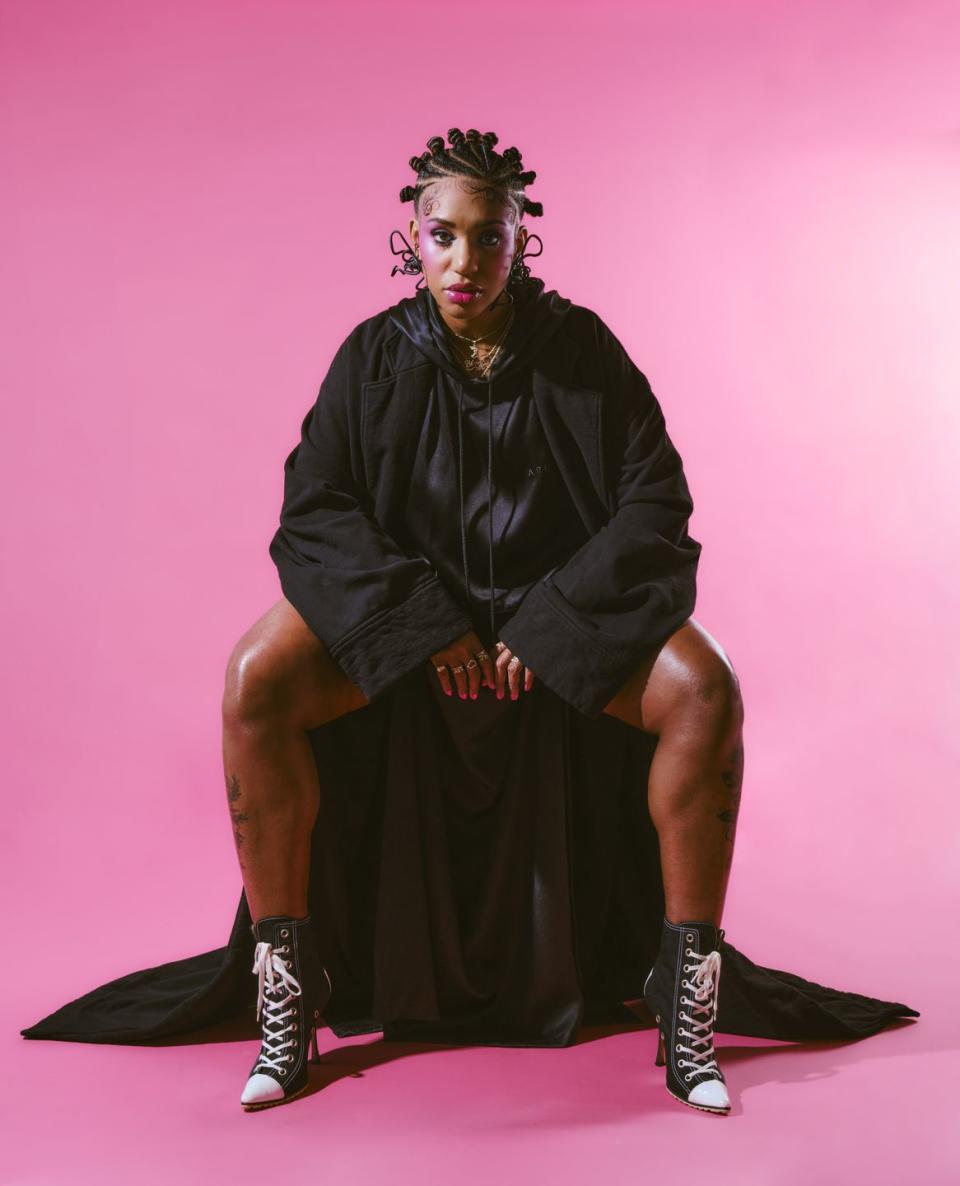Yaya Bey Probably Won’t Read This Interview

After Yaya Bey released her last album Remember Your North Star in 2022, her life drastically changed. “I started making a living as a musician after that album,” she says. “Before that, I was very much not. I was working in the homeless shelter system for a while teaching art. But now, I’m a musician full time.”
And she’s a lot busier than she’s ever been. In the months leading up to her new album Ten Fold—out on May 10—she’s released several lead singles and music videos (all of which she creative directed, produced, and styled). And a few weeks ago, she performed her first Tiny Desk concert.
But amidst all of the success, Bey also experienced the tragic loss of her father. Ten Fold’s title, which was inspired by the Biblical tale of Job, is a tribute to him. “The story is about how Job loses everything,” she explains, “but then God gives it back to him tenfold. My dad was a musician and he lived in a time where the music industry was just super rotten and corrupt, and that ultimately ended his career. And now I’m coming in behind him, so I like to imagine myself as the tenfold.”
While the album shows Bey maneuvering through grief and major life changes, it’s also full of self-affirming and braggadocios tracks like “sir princess bad bitch” and “east coast mami.” The video for the former takes place in a hazy jazz bar and shows Bey shimmying in sequins and glitter during multiple choreographed sequences, further solidifying the familiar fact that during moments of intense heartbreak, we can still find time to dance.
In honor of Ten Fold, Bey sat down with ELLE.com for an interview that she probably won’t read (more on that later).

How does it feel to finally be able to make a living as a musician?
It’s great. It’s scary, too. Financial things look a lot different when you’re making money from music. I’m new to navigating the fact that I’m a business, but it feels a lot better than going to a job and then also having to do this at the same time because this takes up so much energy. But it does feels rewarding to have my work pay off.
On your new album Ten Fold, what themes were you interested in exploring?
This is the first project that I went into where I didn’t intentionally set out to explore themes. It’s not thematic. I just made songs as things popped up and wrote about my life in real time. I wrote about what was most relevant.
Did not being tied to a specific theme make you feel freer as you were making it?
I don’t think that I ever really feel confined by work. I think I always feel free in the making of it. It was just a different way to make it. I might have been freer in my circumstances. This is the first album I made as a full-time musician and my only job was to make the album. I was in a completely different headspace, so I might have been freer in that way.
Getting into the songs, I really like “chasing the bus” and I read that it has a double meaning.
It’s about self doubt and the doubt that people project onto me. I wrote it in a way that it may be perceived like a romantic relationship but it’s really about doubt. It’s weird. It’s the song I actually prefer to talk about the least. But I mean, you wouldn’t know that so it’s not your fault. I have some bitterness with that. Not necessarily with the song itself, but with some behind the scenes things. That’s the song I want to give the least amount of attention to.
How do you feel about the song “eric adams in the club?”
I wrote that song because there was this day last year when there were fires in Canada that made the air quality in New York really bad. The sky was orange and shit and, obviously, there needed to be some kind of emergency solution or something to help. But that night, Eric Adams [the Mayor of New York City] was in the club with Robert De Niro. So I wrote that song. I have a strong disdain for Eric Adams beyond that incident, but that was the one where I was like, “I’m gonna write a song about him.”
Hopefully he hears it.
[Laughs] Yeah, that would be ideal.
I like how some of the titles reference artists like Frankie Beverly and Carl Thomas. Did their music influence the project at all?
Frankie Beverly is one of my favorite musicians of all time. And I love Carl Thomas but that’s more a reference to me being more emotional than I’d like to admit. You know that term, “sliding down the wall like Carl Thomas?” He’s known for being in his feelings. So [the concept] was just me doubling down on that.
I also wanted to tell you that “sir princess bad bitch” is a favorite in the ELLE office.
When I was making that song, I was feeling a lot pressure to make good music because my last album was received so well. I was like, “Oh God, what if I can’t make another good album or something?” And then I just started to reassure myself, like, “All I’ve got to do is show up as myself.” So it started in that way, just me trying to affirm myself that I just have to be authentic and I’ll be alright.
A lot of these songs sound like mini affirmations. Do you incorporate affirmations in your personal life? Maybe taping Post-its to the wall with encouraging quotes, and stuff like that?
I did at one point in my life, definitely when I was going through my Saturn return. Now, I still rely on affirmations but I’m not taping them to my wall anymore. I’m moving through life a lot faster than I did before, so that’s not to say that I won’t return to doing that, but at this point in my life, my days just go so quickly. I’m in a lot more of a hustle and bustle than I was before.

How have you been adjusting to this new faster-paced life?
Every day is different, to be honest. Some days it feels like a roller coaster that I want to get off of. And other days, I feel really grateful and I can be present with it. But right now, I’m not as present with it as I’d like to be. By the time one moment comes, the next is here. The moments tend to overlap. There isn’t enough time to take them in and celebrate. But now I’m working on being more intentional about taking breaks.
In previous interviews, you mentioned that you were working on self compassion. Is that still the case?
Self compassion is something that I’m always working on. It really takes a constant shifting of your perspective. And if you think that you’ve mastered compassion, you probably haven’t. It starts with the self. You can’t give people grace for things that you can’t give your own self grace for. It’s a constant softening.
Is there anything about your creative process or who you are as an artist that you never get asked about that you’ve always wanted to share?
Today an interview that I did came out and I didn’t read it. I was talking to my manager and he said that it was a really good write up, but everything is up for interpretation, you know? Seven people can witness the same car accident and there will be seven different stories of how that happened. Going back to self compassion, how I’m perceiving myself and my art almost never aligns with how other people see me. I’m trying to remember that as I’m having these interviews. Like, you’re gonna write this story and you’re gonna write the story in the way that your gifts allow. You’re gonna write it in a way that touches people and someone’s gonna read it. It’s your art, you know what I mean? I’m just the subject. It’s about me, but it doesn’t really have anything to do with me.
It’s a part of the job and it’s a part of the ecosystem. I don’t know you and you don’t know me, but I’ve done work to be good at my craft and you’ve done work to be good at yours. I make art about things and you make art about things. And in the process of you making your art, it spreads the word about mine. Someone will be touched by what you did and then maybe be curious about me. I’m participating in an ecosystem. This is more about you than it is about me. But that’s how it goes. The thing that I don’t enjoy about [interviews] is that I just don’t like to work. I try to tell people when I play my shows that sometimes I don’t want to be there. I’m gonna do it and give it my all, but I don’t want to be dehumanized in a way where I have to sing and dance and be happy about it all the time. I think it’s helpful for you to know that this is a job just like you have a job and sometimes you go to your job and you don’t wanna do your job, but you’re still gonna do a good job because it’s your job.
So, long story short, you probably will not read this interview when it comes out.
Maybe not. But I think it’s also healthy to not be so into what people are saying about me, because that’s so much of what the job is and it’ll eat away at you, whether it’s good or bad. I don’t think it’s healthy to be exposed to that many opinions about yourself. With this album, I just hope that people like it and that they can tell I put a lot of work into it. I tried.
This interview has been edited and condensed for clarity.
You Might Also Like


